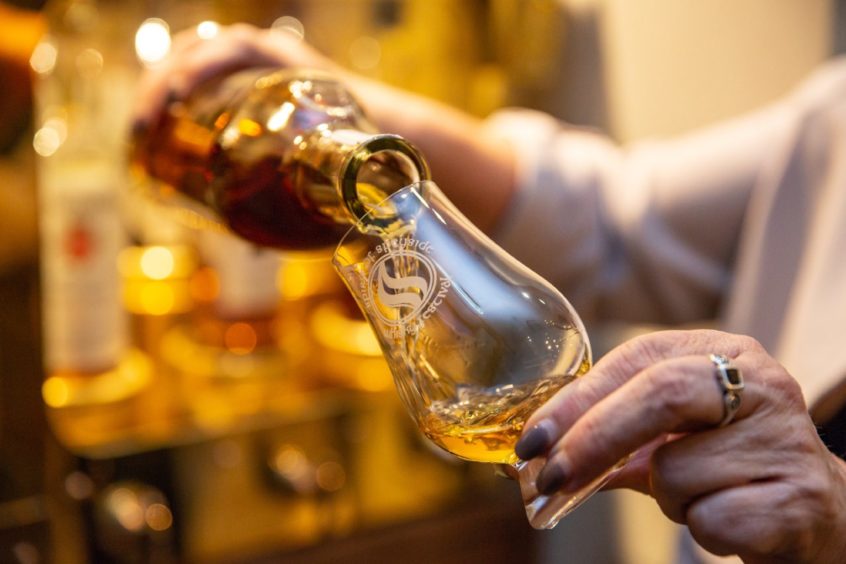More whisky distilleries are springing up all the time to help satisfy worldwide demand for the popular spirit.
Twenty years ago there were fewer than 110 sites in operation around Scotland.
Today that number has grown to 134, with around 10 more under construction or planning to open in the coming year.
Consumers are keen to discover Scotch whisky, and the variety of new distilleries and expressions on offer only adds to that appeal.”
Graeme Littlejohn, director of strategy and communications at the Scotch Whisky Association, said: “Opening or reviving a distillery is good news for local communities and the national economy.
“More distilleries mean more jobs, more investment and more business for our supply chain, including the hospitality sector, which has had such a tough year.”
Whisky has a global appeal unmatched by any other spirit, Mr Littlejohn said, adding: “It is exported to almost every country in the world, and you’d be hard-pressed to find a city where you can’t enjoy a dram of Scotch – from Bogota to Beijing.”
New export opportunities
New distillers are hoping to add to the almost 40 bottles of Scotch whisky exported every second and take advantage of likely future trade opportunities, including in India.
Mr Littlejohn said: “India is the largest market for whisky (and whiskey, its non-Scottish cousin) in the world, but Scotch only has 2% of it.
“If India’s 150% tariff is reduced and exports increase, more Scotch will be needed to fill the demand.”
Exports of Scotch have grown consistently over the past decade. While recent events have hit the industry hard, there are now clear signs of recovery in global markets.
Mr Littlejohn added: “The US, which was hit in 2019 by a 25% tariff on single malt Scotch, is now beginning to recover. The tariff was suspended in March and Covid-19 restrictions have begun to ease.
New Speyside distillery taking shape and on track to open next summer
Whisky industry hit by supply chain disruption as new figures show ‘promising’ export growth
“We’re also seeing encouraging growth in new and emerging markets, including China, which has seen record growth this year – outstripping its 2019 import total in the first six months of this year alone.
“Consumers are keen to discover Scotch whisky, and the variety of new distilleries and expressions on offer only adds to that appeal.”
Whisky is now a 500-year-old industry that has seen its fair share of challenges over the centuries.
Mr Littlejohn said: “The industry plans for the long-term. After all, the spirit put in a cask today won’t be Scotch whisky until it has matured in Scotland for at least three years, usually longer.
“That’s why the industry identifies new opportunities to keep distillers thriving for another 500 years.
‘Always looking to the future’
“Whether it’s investing in our collective efforts to reach net-zero emissions by 2040, in training the master blenders and distillery managers of tomorrow through apprenticeship programmes, or anticipating the increase in visitor traffic as restrictions ease and people from around the world start to explore Scotland again, the Scotch whisky industry is always looking to the future.
“It hasn’t been plain sailing, and the sector has a long way to go before it fully recovers from the damage of the past two years – including the impact of the Covid-19 pandemic on hospitality and global travel retail, and 18 months of tariffs in our biggest export market.”
He added: “Government support – both at home and in global markets – will help the Scotch whisky industry to play its full part in the UK’s economic recovery, and to keep investing in the people and places that make our spirit special.
“That support can start by reducing the 70% tax burden on the industry in the UK, which is a significant barrier to growth.”
Scotch accounts for 21% of all UK food and drink exports and 75% of all Scotland’s food and drink exports.
A major contributor to the UK economy
The sector contributes £5.5 billion in gross value added to the UK economy, while global exports of whisky are normally worth more than £4bn annually.
Whisky supports more than 42,000 jobs in the UK, and employs 11,000 people directly, including 7,000 in rural areas of Scotland.
And the industry boasts more than £1bn in capital project investment over the past five years – £250 million of which was spent on tourism.



